malawi
Text Editors and Electric Kettles
I just read a great article on interfaces by Baobab's Mike McKay entitled Text Editors and Electric Kettles. It's really worth a read. It's the kind of thing I'd show to design students, it's so good. And it also does a nice job summing up some of the challenges and solutions that they're working with specifically down in Malawi. And, hey, if you have a digg account, bump the story up!
- Mike's blog
- Comments



- 4861 reads
Hospital Observations
Today's observations in pictures:
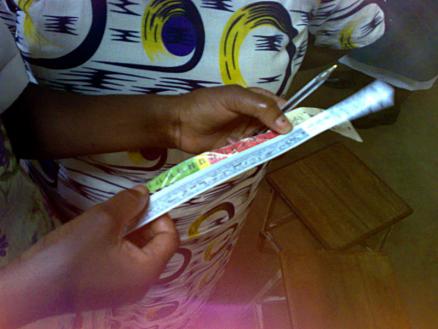 Battle of the Bands: Nurses in Kamuzu Central Hospital's Children's Ward C, which is dedicated to therapeutic nutrition, compare the UNICEF-style MUAC band with the prototype we've created.
Battle of the Bands: Nurses in Kamuzu Central Hospital's Children's Ward C, which is dedicated to therapeutic nutrition, compare the UNICEF-style MUAC band with the prototype we've created.
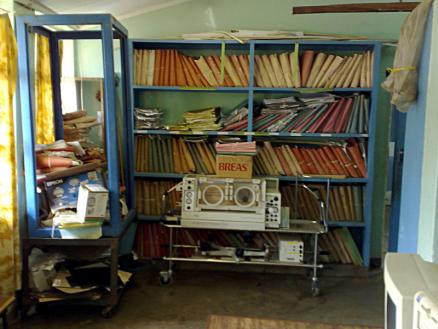 Paper Records: One of the driving forces behind implementing Baobab's patient-manage system in hospitals is to help reduce the problems associated with keeping paper records. Here we see the destination of many records that are only a few years old.
Paper Records: One of the driving forces behind implementing Baobab's patient-manage system in hospitals is to help reduce the problems associated with keeping paper records. Here we see the destination of many records that are only a few years old.
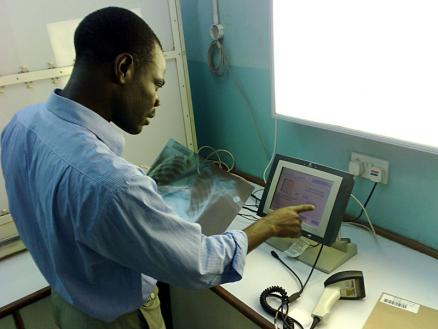 Rashid Demonstrates the X-Ray Process: One of the best-loved features of the Baobab system is its use with tracking and reporting on x-rays.
Rashid Demonstrates the X-Ray Process: One of the best-loved features of the Baobab system is its use with tracking and reporting on x-rays.
- Mike's blog
- Comments
- Read more



- 5328 reads
Paper Records

One of the driving forces behind implementing Baobab's patient-manage system in hospitals is to help reduce the problems associated with keeping paper records. Here we see the destination of many records that are only a few years old.
- Comments



- 12871 reads
Battle of the Bands

Nurses in Kamuzu Central Hospital's Children's Ward C, which is dedicated to therapeutic nutrition, compare the UNICEF-style MUAC band with the prototype we've created.
- Comments



- 12337 reads
Rashid Demonstrates the X-Ray Process

One of the best-loved features of the Baobab system is its use with tracking and reporting on x-rays.
- Comments



- 11995 reads
Week One Round Up
A great amount of work got done thanks to the help of everyone here. Below is the latest prototype. It's printed on paper, but another version is making the rounds that was printed on indestructible HP LaserJet tough paper, a kind of polyester film available in consumer sizes.
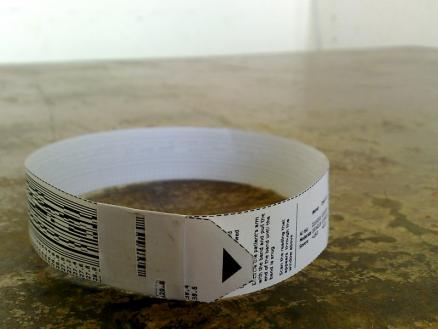 The Latest Prototype
The Latest Prototype
I was also able to get the ART system up and running for the AIDS clinics. Based on the observations we made earlier in the week, I was able to hack into the Ruby on Rails app and get it to work along with the bar-code scanner. Now MUAC data goes straight into the database--a full prototype system, working end to end! Sweet! And it works pretty much as expected (minus bar-code reader) on my touchscreen Nokia internet tablet.
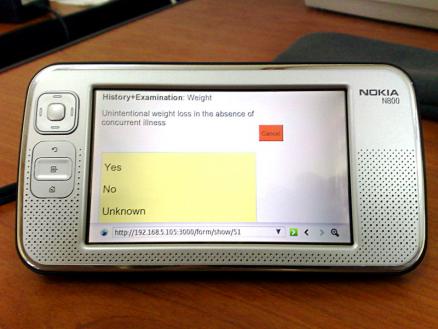 ART application on the Nokia 800
ART application on the Nokia 800
So, next week is testing and observations. That should give me ample time to make adjustments before heading back to the states.
- Mike's blog
- Comments
- Read more



- 6683 reads
tags
Copyright Mike Edwards 2006-2009. All content available under the Creative Commons Attribution ShareAlike license, unless otherwise noted.




